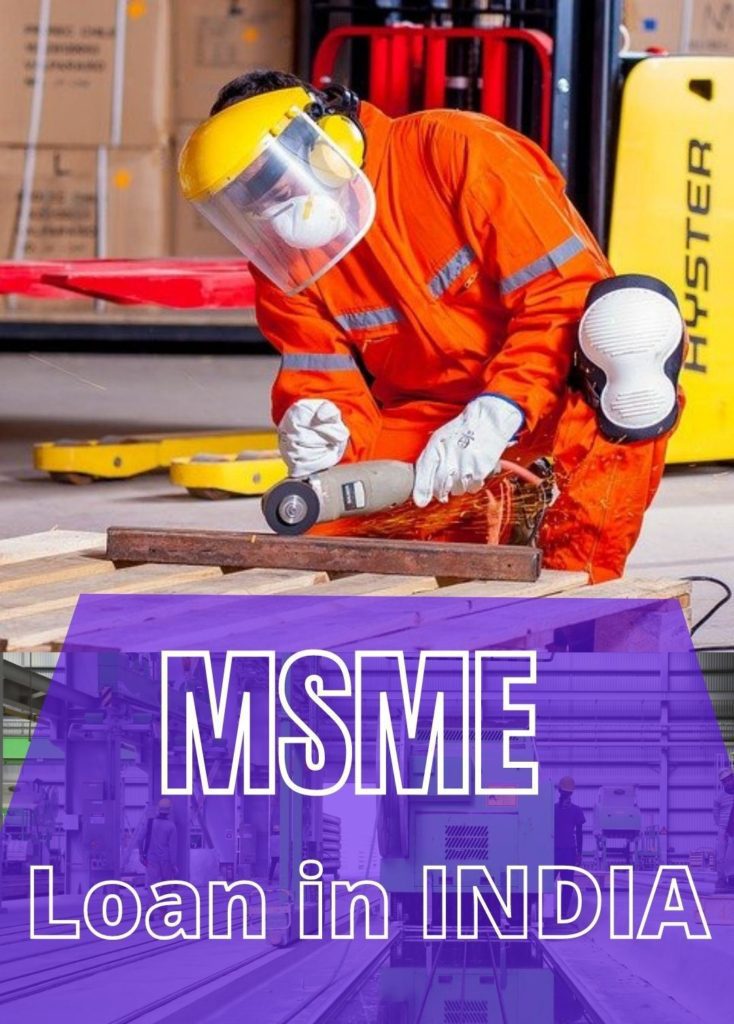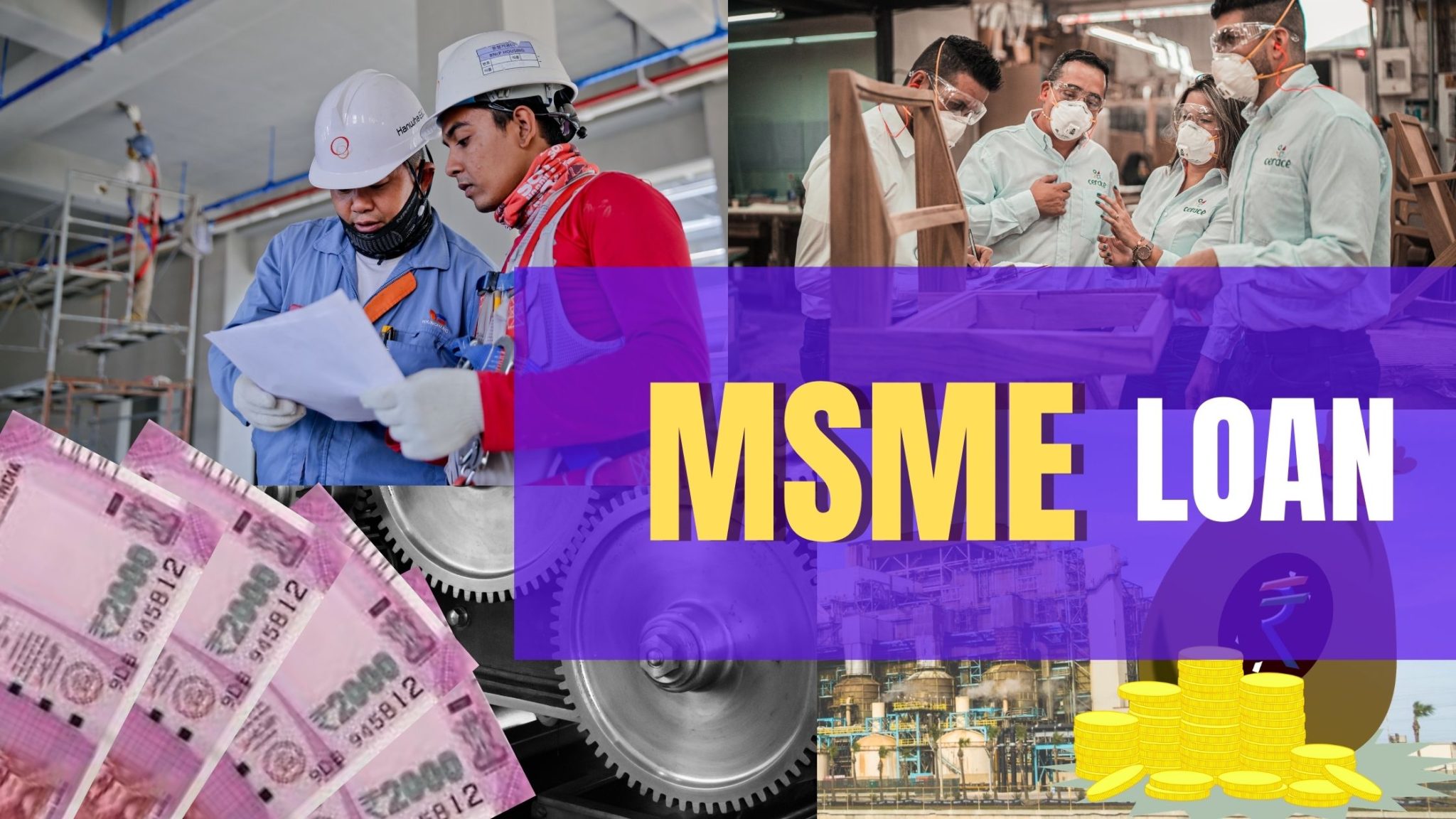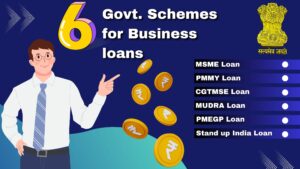What is an MSME loan?
MSME stands for Micro, Small, and Medium Enterprise. It is sometimes called SME for small and medium enterprises, but both are the same in reality. In 2006 The Government of India introduced the Micro, Small, and Medium Enterprise Development (MSMED) act to promote the MSME sector. Earlier MSME loans fell under two categories, Manufacturing and Services. But on 1st July 2020, the definition of MSME has been changed based on the Composite Criteria of “Investment in Plant & Machinery/equipment and Annual Turnover.”
Mostly, these loans are provided by financial institutions to individuals, SMEs, MSMEs, Entrepreneurs, and Startups on a short-term basis for their business expansion purposes. Business owners, Entrepreneurs, and enterprises majorly use MSME loan schemes to meet their working capital requirements.
MSME loan plays an essential role in country’s economic growth and contributes around one-third per cent of India’s total GDP. In addition, it generates employment of approximately 110 million of the population. MSME loan also plays an essential role in the country’s social-economic development, as many enterprises operate in rural India.
In an annual report of 2018-2019, more than 6 lakh MSMEs operate working across the country. Typically, most banks and NBFCs offer SME and MSME loans without asking for any collateral or any security from the borrowers. But as MSME loans are unsecured loans, there are some minimum eligibility requirements to reduce the risk for lenders.
MSME Loan Eligibility
The eligibility criteria of MSME loans in 2021 very much depend on where you are applying for the loan. Each financial institution has their term or standards, and those may not be the same as always. Usually, to avail of an MSME loan, you need to fulfil certain eligibility criteria. These are listed as follows:
- An established business should be in operation for more than six months.
- The business setup should not fall under blacklisted categories or excluded the list for SBA finance.
- The investments in the manufacturing sector must not cross ₹10 Cr.
- The limit of investment in the service sector should not exceed ₹ 5 Cr.
- A minimum turnover should be ₹ 90,000 or more in the three months preceding your loan application.
- Any type of NGO, trust and charitable institution are not eligible for an MSME loan.
- The applicant for an MSME loan should be between 25 to 65 years of old.
- The applicant must be an Indian resident and have a good CIBIL Score.
“Naskar Financial Services is the most trusted Loan Consultant in Kolkata as per our customers. You may contact us for advice to get your MSME Loan easily and quickly”
– Chife consultant
Documents Required For MSME Loan?

Once you met the above eligibility criteria, you have to submit only a few documents to get an MSME loan approved.
The list of documents required for an MSME loan is as follows:
- KYC Documents:- Aadhaar Card, Voter ID card, PAN card, Driving license, Passport, etc.
- Address Proof:- Utility bills such as water, electricity, or broadband bills, Rent agreements, Ration card, etc.
- Finance Proof:- Copy of ITR documents, Profit and Loss statements, GST returns, banking statements, or passbook copies.
Business-ownership Documents:- Business registration documents, partnership agreements, etc
How to apply for MSME Loan in 2021?
The process of applying for an MSME loan in 2021 is straightforward. The first thing you have to do select a suitable lender that offers your business the variation of T&C when applying for an MSME Loan. The lender can be any bank, NBFC, or other financial institution. The flexibility and simplicity of application should be the primary criteria when looking for a loan.
In this digital age, applying for MSME loans in India online is the most common process nowadays. Within few steps with minimal documentation, get funds in your bank account within days. Before you begin your loan application process, keep all necessary documents ready for simple submission during the process.
To do that, you need to visit the official website of your selected lender. Fill in all the mandatory fields displayed on your screen, including your personal information, business details, and income details, and then follow it step by step accordingly. Now click the submit button for the next step.
Upload and submit all the required documentation together. After presenting the documents, you will receive a call from the selected bank’s loan executive to continue the loan procedure. After the verification check of your records and application form, the bank shall approve the loan and will transfer the fund into your business account within few days.
MSME Loan Subsidy
Micro, Small, and Medium Enterprises (MSME) require funding to grow. That’s why the Government of India has come up with many schemes or subsidies to grant credit to MSMEs. Other hand the banking sector and other financial institutions also provide credit to them. Some of the well-known schemes of MSME loan in 2021 are –

- Credit Guarantee Trust Fund for Micro & Small Enterprises (CGT MSE):
Credit Guarantee Funds Trust for Micro and Small Enterprises is a scheme launched by the Government of India for offering credit guarantees to financial institutions that provide loans to MSMEs. CGTMSE guarantees lending institutions a specific limit for all lending done to the MSME sector.
Both new and existing enterprises are eligible. This scheme can give maximum loan guarantees of up to 2 crores or 75% of the project cost to MSMEs. Qualified women entrepreneurs from the Northeastern states of India, including Sikkim and Jammu, and Kashmir, also provide a particular preference under this scheme.
In this scheme, the trust will charge 1% p.a fees of the amount sanctioned. For credit facility up to Rs.5 lakh, charge 0.50% fees, and credit facility from Rs.5 lakh up to Rs. 1 crore, charge 0.75% of the guarantee amount. CGTMSE comes with a guarantee coverage of up to 75% of the defaulted principal amount. And up to 85% of the defaulted amount for a select category of borrowers.
It also comes with a maximum guarantee cap of Rs. 37.50 lakh, and for the credit facilities up to Rs. 50 lakh. Other charges, such as service charge, commitment charge, penal interest, or any other levy/ expenses, do not qualify under the guarantee cover.
Almost every bank provides CGTMSE to offers financial support to any specific sector. These financial institutions include Small Finance Banks, Regional Rural Banks, NBFCs, and others lending institutions, such as NSIC, SIDBI, NEDFi, etc. You can approach any of these financial institutions to get a CGTMSE loan.
- Pradhan Mantri Mudra Yojana (PMMY):
Pradhan Mantri MUDRA Yojana (PMMY) or known as MUDRA loans is a scheme launched by the Hon’ble Prime Minister of India on April 8, 2015, to provide loans up to 10 lakh to non-corporate, small/micro-enterprises. You can approach PMMYloans at any Commercial Banks, Small Finance Banks, RRBs, NBFCs, and MFIs.
You may also apply through this online portal https://www.udyamimitra.in/. Under PMMY, there are three different schemes, namely ‘Shishu,’ ‘Kishore’ and ‘Tarun,’ which signify the stage of development or growth and the funding need of the beneficiary micro-units or entrepreneurs and it also provides a reference point for the next phase of graduation or growth.
- Prime Minister’s Employment Generation Programme (PMEGP):
Prime Minister’s Employment Generation Programme (PMEGP) is a Government of India financed credit-linked subsidy program introduced in 2008. The Ministry of MSME administers the PMEGP but is implemented by Khadi and Village Industries Commission (KVIC).
PMEGP merges two schemes, namely, Prime Minister’s Rojgar Yojna and Rural Employment Generation Programme. Under this scheme, you can get a subsidiary around 15% – 33% of the total project cost from the government. The loan limit of PMFGP is from 9.5 lakh to 23.75 lakh, and the interest rates of this scheme incur between 11% – 12%.
This scheme focuses on creating self-employment possibilities in rural and urban areas through micro-enterprise establishments in the non-farm sector by supporting unemployed youth and traditional artisans. To apply for PMEGP, visit this portal https://www.kviconline.gov.in/pmegpeportal/pmegphome/index.jsp and fill the online application.
- Credit Linked Capital Subsidy Scheme (CLCSS):
Credit Linked Capital Subsidy Scheme or CLCSS for technology up-gradation for MSME and Small Industries. It was started by the Government of India in October 2000. This scheme is mainly focused on MSMEs to help to improve their technology for optimizing revenue generation and development of Small Scale Industries (SSI) in rural and urban areas across the country.
Under this scheme, qualified enterprises can enjoy a subsidy of 15% on loans with an upper limit of Rs.1 crore. To claim a subsidy under CLCSS, you have to apply online via Primary Lending Institutions (PLIs).
- SIDBI Make In India loan for Enterprises:
SIDBI Make in India Loan for Enterprises (SMILE) is launched to take ahead the Government of India’s ‘Make in India’ campaign and help MSMEs participate. The main goal of SMILE is to provide financial support to small enterprises within the MSME sector.
This scheme is suspected of helping approximately 13,000 enterprises and will create employment for almost 2 lakh persons. The purpose of SMILE is to provide a soft loan, like quasi-equity and term loan on relatively soft terms to MSMEs to meet the required debt-equity ratio for establishing an MSME and pursuing opportunities for growth for existing MSMEs.
- Credit Guarantee Scheme for Subordinate Debt:
Credit Guarantee Scheme for Subordinate Debt (CGSSD) is a government-originated scheme that aims to support MSMEs’ promoters have turned into Non-Performing Assets (NPAs) as of 30th April 2020. The scheme will provide necessary support by giving a specific amount as equity for the MSME units to grow.
MSME Loan Consultant
People who provide advice to Micro, Small and Medium-size enterprise to get MSME loan is called MSME Loan Consultant or advisor. Most of them work as an intermediary between the bank and the customer. For more information click the below link.
We, Naskar Financial Services provide consultancy of loans. We have more than ten years of experience in loans. We are associated with more than 25+ Banks and NBFCs. We not only provide advice but also arrange loans for the MSMEs. We do all types of Business Loans and Loan Against Property apart from MSME loans. Contact us for more information.
Chief Consultant
Read Also-









Pingback: Term Loan for Business - Naskar Financial Services
Pingback: MSME Loan Consultant - Naskar Financial Services